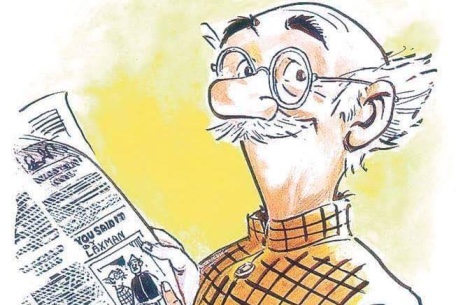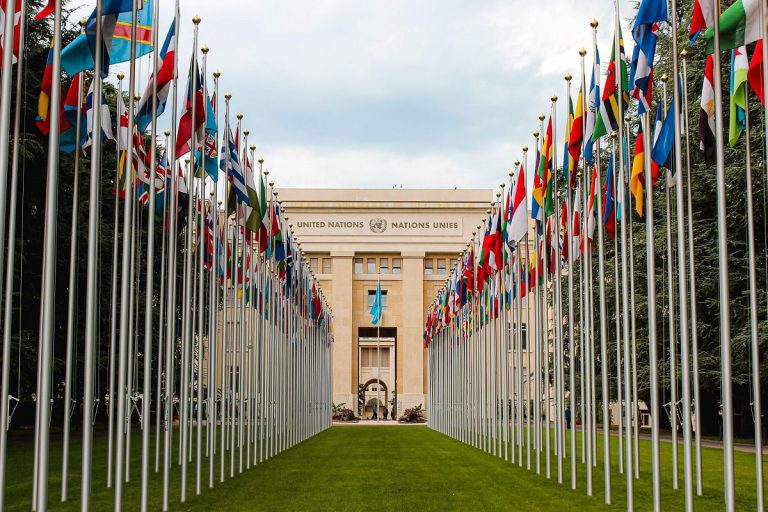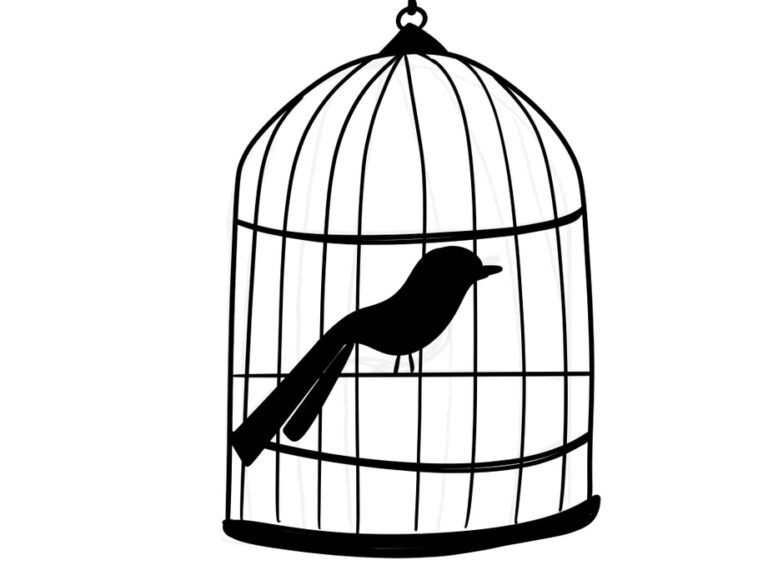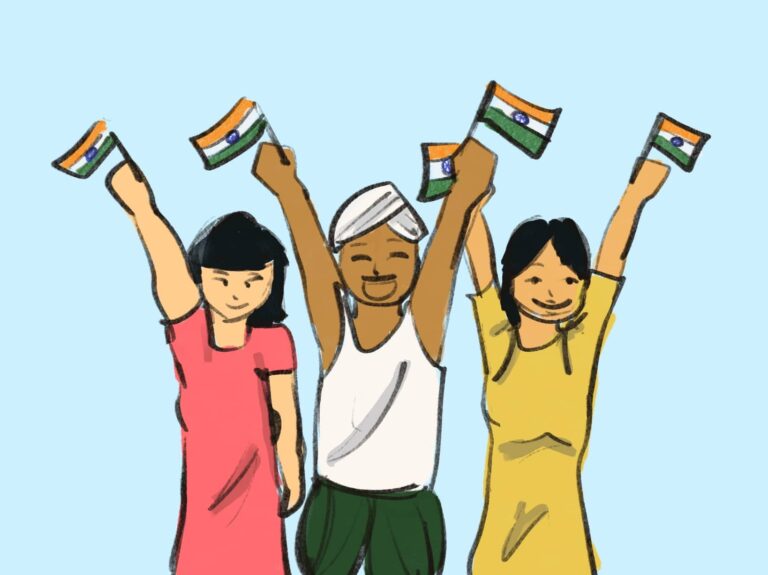Kabhi Nepo Kids, Kabhi Serial Strugglers – Nepotism in Bollywood

Not Hinduism. Not Christianity. Not Islam. And certainly not cricket.
I grew up in a household where our religion was cinema.
Ever since I can remember, everyone in my family was passionate about the movies.
Some, like my dad, are snobby avant garde pseudo-movie critics.
They don’t watch movies to just have fun. They see each movie as a one-of-a-kind experience. They soak in the beauty of the cinematography, immerse themselves in the convoluted plots and indulge in the finer easter eggs, sprinkled in by the filmmakers and actors.
On the other hand, there are the mass masala maniacs. They’re the ones constantly bickering over the Khan of all seasons, Mammooka or Lalettan, and all the latest bits from Koffee With Karan.
They care not for the craft. Rather, they revel in gossiping about actors, directors, and more, like the people in the film industry are their own blood relatives.
My mother (I have to give her full credit here) is the leader of this pack. She’ll most likely forget the mega-flop plays I’ve written in school for my school projects, but she’ll tell you everything about the shadiest of Bollywood gossip from the 1950s, even if you shake her awake in the middle of the night.
(What the hell, the night before I was supposed to take my Advanced German exam, my Mother India and her best friend, my very cool Tejas Aunty, were gossiping about Jalayalitha and MGR and doing critical deep-dives on how Sobhan Babu fit in their convoluted equation. While I was preparing for the toughest exam of my life.)
I like to think that I fall somewhere in the intersection of both sets.
On one hand, I absolutely love chewing my brain over the foreshadowing, parallels, and the finer nuances of niche movies like Bulbul, Yuva, or Tamasha.
On the other hand? I have a BLAST dissecting mainstream Bollywood cinema and the pop-culture surrounding it. And yes, that includes the gossip surrounding it.
I not only watch new mainstream movies whenever they come on OTT, I also rewatch my all-time favourites, Kal Ho Na Ho, Om Shanti Om, and all the comedy scenes from Kabhi Khushi Kabhi Gham (only because the Gham part in this movie really is nauseatingly sickening but the comedy, people, is top-tier and unmatched).
And it doesn’t end there.
I shamelessly love engaging with the debates surrounding the celebrity pop culture. In my free time (which is becoming more and more like Eid ka chand as I grow older and none-the-wiser), I read movie reviews, watch cinema-related interviews, and chuckle at the wildest of comments on Reddit threads.
And one of the raging debates that I love mulling over, these days? Is our all-time favourite Bollywood topic, these days, first brought to our attention by our very own kaleshi Kangana Ranaut.
Nepotism.
AKA the dreaded n-word.
Nepotism X Today’s Bollywood
A Love Story Much Worse Than Twilight
Even if you’re an enlightened philosopher of today, who ignores pop culture like the next incoming of the bubonic plague, I’m very sure that you’d know that the world of Bollywood is kind of like a Joint Hindu Family Business.
Somehow, everyone knows everyone. And happens to share a percentage of their own DNA with everyone.
Back when cinema in India was developing, nepotism wasn’t much of a problem. Because for every person from a film family, there was almost always an ‘outsider’, who would be doing equally as well, if not better.
When my great-grandmother was in her 20s, for every Raj Kapoor, there was Dilip Kumar.
When my grandmother was in her 20s, for every Nutan, Tanuja, and Rishi Kapoor, you had Rajesh Khanna, Amitabh Bachchan, Dharmendra, Jaya Badhuri and Hema Malini.
When my mother was in her 20s, for every Salman Khan, Aamir Khan, Ajay Devgan, and Karisma Kapoor, there was a Sridevi, Shah Rukh Khan, Madhuri Dixit, and Akshay Kumar.
But when I’m in my 20s? The less said, the better.
No matter where you look, you see children from film families everywhere. You see them in masala films, you see them doing ads, give interviews like they’re the next incoming of Meryl Streep, when you and I both know that Meryl Streep’s jaw would drop (and stay dropped till the end of Kalyug) listening to some of the stupidest things these nepo kids say with full confidence.
It doesn’t end there.
Unlike the nepo kids of yore, the current nepo kids are often presented as flawless, immaculate Mary Sues and Gary Stus who you HAVE to like. A lot of this perception is all thanks to the aggressive PR machinery that can put some of the most famous ad campaigns to shame.
They employ bots commenting the same thing on all social posts to build positive sentiment for the most inane acting, create fan pages, and focus on increasing social media engagement. And film producers actually use social media metrics to cast these nepo kids because they have ‘more followers’ and may translate to more ROI.
I’m no Ramanujan. But bluntly speaking, a lot of nepo kids with higher Instagram follower count, like Sara Ali Khan, Janhvi Kapoor, and Ananya Panday categorically do not have any ‘clean’ hits or relevant pop culture defining movies that they can take credit for. Contrastingly, their contemporary ‘outsiders’ like Tripti Dimri, Mrunal Thakur, and Sharvari Wagh have created more organic buzz, despite having fewer opportunities.
So I don’t get the logic. The math is clearly not mathing.
(Do note: I’ve only taken examples of female actors here because currently, the male ‘nepo’ Gen-Z nepo kids haven’t had relevant theatrical releases.)
Furthermore, the PR agencies prop up these stars from film families positively while constantly looking for sneaky marketing tactics to smear actors and other professionals from non-filmy backgrounds.
With all of this clutter, against your will, you’re forced to hear from these PR agencies’ grating campaigns how these nepo-kids are God’s gift to cinema.
(When you, I, and every other common person know that even all the Gods out there would be shaking their heads in dismay seeing this sheer delusion and utter disintegration of the magic that was Bollywood)
To sum it up bluntly, with the advent of social media, it feels like cinema’s nepotism today is a chakravyuh sucking us all into its frenzy of sheer mediocrity.
(Is chakravyuh even the right word? Like the new age actors from film families today, my tapori Bambaiyya Hindi would make Premchand have ten cardiac arrests in quick succession)
For the most part, as a pretentious cinephile who-thinks-she-knows-it-all-but-doesn’t-know-at-all, even I’m not a big fan of nepotism. And I mostly avoid movies featuring products of nepotism like the next incoming of the bubonic plague.
(I only make exceptions when I’m truly in the mood to troll, like the cinematic gem that was Naadaniyan. I had the loveliest time watching that entire movie and giggling at its sheer absurdity and out-of-touchness)
If it’s a Darlings or an October or my very favourite Lootera, I’ll watch such movies sincerely. But if it’s something as crappy as Love Aaj Kal (not the cult classic one, but the truly revolting ‘Tum mujhe tang kar rahe ho’ trash), I’d most definitely not see it.
While I’ve long accepted that cinema will always somehow be enmeshed with nepotism in one way or another, what I don’t like is?
How the nepotism in cinema (especially Bollywood of today) is rather extraordinarily rife with sheer inequalities.
To put it simply, take a movie review, for example.
If it’s a movie starring someone who is from a film family, the language usedlanguageverbiage used to describe this person’s work would be exponentially kinder as compared to a movie starring a rank outsider.
I mean, think about it. See any review of a film starring people like Janhvi Kapoor, Agastya Nanda, or that legendary struggler, Ananya Panday. Most reviews would go, “Oh, <Insert Nepo Kid’s Name here> is making an earnest attempt and you can see that they are trying the best they can.”
Whereas the outsider, who has faced exponential hurdles to even get that one chance? Would be called an untalented hack if they make the slightest of mistakes.
And let’s face it. We all know who the real untalented hack is.
There are many instances like this, where you see multiple such levels of inequalities. You see it in something as fleeting as interviews, where quite a few film people most likely rate individuals from prominent film families and circles as ‘‘the best actors’ or ones with ‘the most promising potential’ when a lot of their contemporaries and predecessors were given such titles after going through significant struggles in their careers.
And these inequalities? Are amplified all the more on social media, where the only religion quite a few people follow is outrage.
Now, with the advent of social media, people can see through all this BS. And it irks them deeply that mediocrity is shoved down their throats.
In the past, I just read about it on endless threads on Reddit. Even commented on some of them till I got banned for breaking some subreddit rule that I didn’t even know existed.
But now? In 2025, when we got some incredible cinematic gems in the forms of Skyforce, Loveyapa, and Naadaniyaan, and everyone and their next-door neighbour started trolling it?
It got me thinking. Why are people so outraged about nepotism these days?
It’s because, in some way, the world of cinema and the people working for it? Somehow paint a very painful picture of our real life where contacts are everything. A picture that we don’t like to see, but have to confront, in more ways or another.
Nepowood V/S Your Real ‘Hood
Are they truly alike?
You know, when you’re young and utterly deluded? And you’re happily skipping along, believing that the world is your oyster?
You tend to think that meritocracy is an actual, well-functioning concept applicable in real-life. You think everyone will get what they deserve, as long as they work hard enough.
And then life, with its cruellest sense of humour, makes you realize that that isn’t the case.
Many times, life isn’t a level playing field where everyone stands on equal footing.
There are some, who have a lot of backing, which gives a far faster head start in life. They can study, get married young, have kids fatafat, while working comfortably or they can simply do whatever the hell they want – just because they have the financial backing, pedigree, and contacts.
And there are the rest. Who must build their lives, brick by brick. Learn, stumble, get back up. While they see people with the same (or lesser) level of talent surge ahead.
It’s not fair. Not one bit.
And when you experience life like this, I don’t think you take it very kindly when you see that the world of movies – a world where you expect the underdog to rise against all odds – is now infested with people with an obscene amount of privilege and not enough talent.
It’s like somebody’s holding up an unpleasant mirror in front of you. A mirror that makes you confront the ugly realities of life, head on.
For instance, when you see an industry insider effusively lobbying for a privileged actor from a film family for the bare minimum while pulling down strugglers, you’re reminded of that snobby aunt or uncle, who looks down on you even when you’re doing more than enough and brags about how their lazy kid is the best thing to happen to this universe since sliced bread.
Even a small moment like this is an unpleasant reminder of what you go through, day in and day out.
And it gets even more grating, when nepo kids talk about how hard they’ve had to struggle in their careers and get defensive. They often use this argument:
“A doctor’s kid becomes a doctor. Why can’t an actor’s kid become an actor?”
While there’s nothing wrong in becoming an actor if your parent is an actor and everyone is free to choose their profession in a democracy, I’d really like these nepo babies to open their eyes and see the reality, for a change.
A doctor’s kid studies to be a doctor. That kid puts in real grunt work to get into a decent medical college and has to actually work with patients. What they do is a matter of life and death. And they have to work for it to get it.
If a surgeon’s kid is given all the surgical tools to perform a heart transplant, while not putting in any efforts like our beloved nepo kids of today do, do you think the patient will actually survive?
No.
What will happen is that this surgeon’s kid will get a lawsuit and could very well likely be jailed, if not given the death penalty.
Let me now ask you this: do most of these nepo kids actually put in efforts for the one thing they’re supposed to do? Be it acting, directing, writing? Do most of these kids put in some level of effort into it?
That would be the biggest, fattest nope.
And this lack of effort? Is like raita failana
(Hey, I actually used a muhavara. Maybe Premchand wouldn’t be so horrified with my Hindi, after all)
As I was saying, the sheer lack of passion that these nepo kids demonstrate towards their job has had a significant ripple effect on the hard work accomplished by all the other members of the cast and crew.
And in turn, has had a massive negative impact on the quality of cinema that we watch today. It’s and it’s significantly narrowed the choices of genres that we can watch. Unlike the previous generations, Gen-Z, at this point, we don’t have any popular new-age actor that we can root for and all we’re left is with… trash...
Is there anything – possibly – anything that we can do about it?
I wish I had an answer to this. I really do.
Honestly speaking, I’m not so sure if I’m evolved enough to give a one-stop solution. I’m a 27-year-old marketer, who just loves reading Bollywood nonsense on Reddit. What do I really know, really?
However, if I were to purely look at it as a girl raised by a family of cinephiles,the only thing I can possibly think of, is… advocate for the underdogs and stop engaging with mediocrity.
Whichever actor, singer, writer you like, who has humble roots and lots of talent – watch their content actively and promote it. Maybe not today, maybe not tomorrow, but someday, thanks to your support, they might get the visibility they truly deserve.
It’s a small step. But at least it’s something.
And even in our real-life, I have to say this:
Quite a few of us, in one way, or the other, have some varying level of privilege. It could be financial. It could be caste-based. It could be anything.
Most of the times, the privileged take their privilege for granted. They expect that they deserve everything, just because they have access to it.
But this privilege if used correctly?
Has the power to change the world for better. In some way or other. It could be little. It could be huge.
But even a little bit of effort? Can go a long way.
For example, if you’re someone who has received superior quality education. You can impart this education to those who don’t have access to it. Volunteer. Tutor. Be a Governance Consultant – do whatever you can, that can help someone’s life be better in some way or the other.
It’s easy to crib about the have-nots. It’s easier to keep whining about them endlessly.
(I say this from experience because I’m a serial whiner)
But if you use your privilege for the better – in whatever way you can? You can make a positive difference.
As pretentiously pretentious manifestation-influencer-esque as it may sound, you just have to trust the process.








